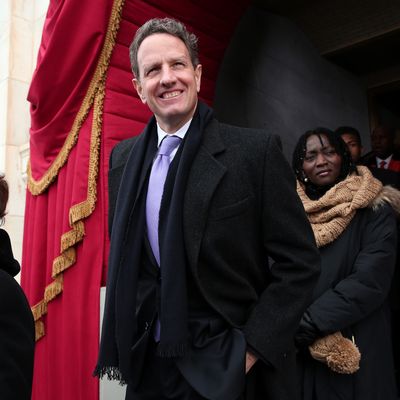
Earlier this year, when he was preparing to leave his position as secretary of the Treasury, Tim Geithner gave a series of interviews, including one to New York. Because his post-office plans were a subject of much speculation at the time by everyone, including his own big-mouthed father-in-law, Geithner told New York he had instituted a Rule, which was to talk about said plans as little as possible. That was understandable, because pundits had staked a lot on whether he would disappear for some wood-chopping therapy or fly into the chubby, soft arms of the industry he had regulated.
If he did the latter, it would prove that the financial crisis bailouts had been engineered not for the greater good of America but for the greater enrichment of Goldman Sachs. If he did the former, well, he could ride high on his earnings from a 25-year-career as a public servant and people would leave him alone. “I don’t know what I am doing to do,” he said. “I can tell you what I’m not going to do. I’m not going to do anything in public policy in public life, and I’m not going to go accept Sandy Weill’s offer from five years ago in some other context,” he said. Then he went on: “I am going to violate my rule now,” he said. “I could have gone and worked for a bank many times and it was never compelling for me, and I don’t see why it would be compelling now.” What about something else on Wall Street? “I find it extremely unlikely,” he said.
Flash forward to this past weekend, when the former Treasury secretary announced that he’s joining the private equity firm Warburg Pincus, as its president and managing director. Geithner’s compensation details haven’t been disclosed, but it’s fair to assume he’s making eight figures a year, at minimum, in one of those letterhead jobs that requires little more than speaking on panels, playing golf with high-level machers, and taking a lot of long lunches.
Is Geithner a sellout? Well, yes, in the strict sense. Geithner now displaces Peter Orszag as the most high-profile Obama administration official to pass through the “revolving door” between government and Wall Street. Noam Scheiber argues that his choice of a post-Treasury private equity career is “corrosive,” because it represents yet another senior economic official succumbing to Wall Street’s wiles, a motif that “reinforces our conviction that the game really is rigged.”
Scheiber is more qualified than most to make these claims. But did Geithner really make an immoral choice?
First, there’s the question of what Geithner should have done instead of going to Warburg Pincus. His options were narrower than you might think. Unlike his predecessor, Hank Paulson, Geithner doesn’t have the vast fortune required to become a full-time philanthropist with a self-funded vanity institute. And unlike Neel Kashkari, another crisis-era economic policymaker, he doesn’t seem to have the desire to run for office. He could have become a university president, or gone on to run the Brookings Institution, but both of those jobs require the same things his Warburg Pincus gig will: lots of travel, endless fundraising and schmoozing with rich donors, semi-frequent speeches. At least in private equity, he’ll be able to get his hands dirty, and it’s a relatively ethical choice in terms of bailout politics — more ethical, certainly, than going to work at Goldman Sachs or Citigroup or another too-big-to-fail bank. (One route that would have saved Geithner from some of the ridicule he’s facing today comes to mind: venture capital.)
Second, there are reasons other than conspiracy for the existence of the revolving door. Finance is an exceedingly challenging subject, and it’s mastered mostly by those with the financial incentives to do so. In the same way that most people with advanced computer programming skills go to work at tech companies, most people who understand the complexities of global finance work in the financial sector. It’s a rare and principled person who understands this stuff well, and who takes jobs in the public sector instead of cashing in. And yet, for 25 years, that’s what Tim Geithner did, despite having had countless opportunities to cash in at earlier points in his career.
This may sound like the world’s tiniest violin, but those opportunities must have been tempting. For three decades, Geithner has been surrounded by people who are much more wealthy and successful than him, people who fly private jets and live in million-dollar co-ops on Park Avenue. He’s smarter than many of them, but they’ve chosen a path that allows them to earn ten, twenty, a hundred times more. “I mean, he makes like 200 grand a year,” one Wall Street guy told New York earlier this year. “Tim doesn’t have, by New York standards, a lot of money,” a friend of his, a private-equity guy, affirmed, obliviously. When told that his friends had pityingly described him as a penniless pauper, Geithner said: “I do joke about people who leave treasury to go to the dark side.” But “I mostly just joke,” he added. “There are lots of moral people I respect who work in finance.”
After all, Geithner’s ultimate incentive could be more simple than a chance to rig the game. It could just be that, as his friend put it, “No one is indifferent, even Mother Teresa, to money.” Moral outrage is something Geithner’s used to. This time he’s getting paid.





























